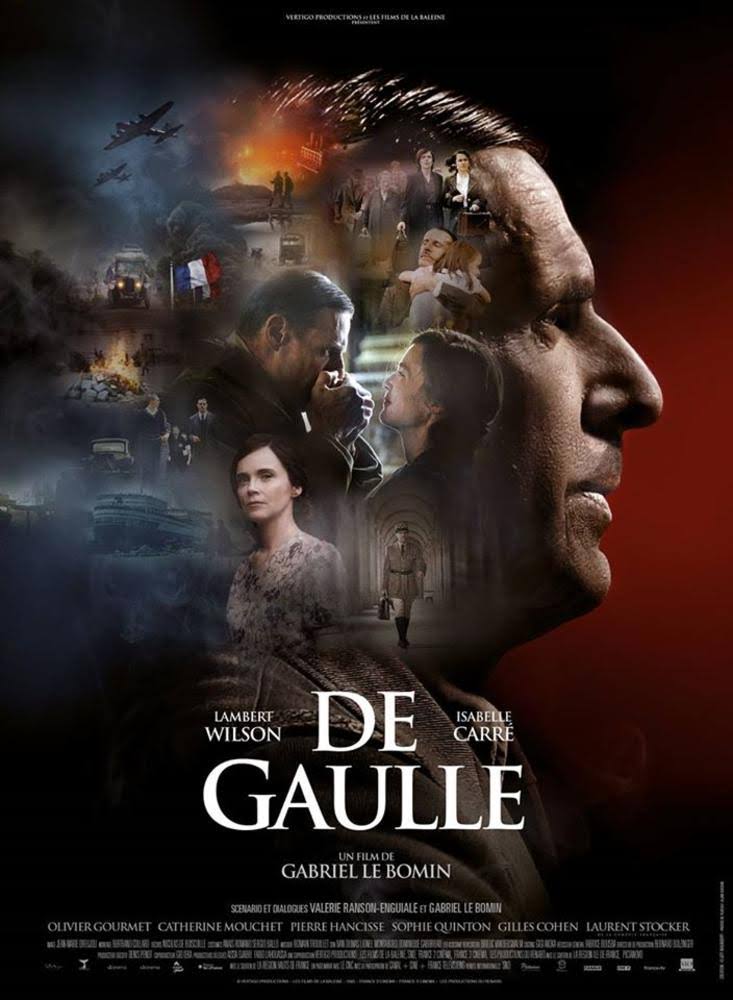This French film tells the story, probably little-known to even baby-boomer Anglos like me who grew up familiar with the main events of WWII, of how Charles De Gaulle went from being a purely military figure to leading the Free French government in exile during the war.
The story is set over just a few days in June 1940. The German army has rolled across the Low Countries and has invaded France. De Gaulle farewells his kin at the picture-postcard family estate at the sublimely named Colombey-Les-Deux-Eglises in north-eastern France. He has just won a victory of sorts in halting the German advance, and must now return to Paris where, as newly-appointed Under-Secretary of Defence, he takes up the fight against those elements inside the weak and divided French government who want to make peace with the Germans.
While he’s away, flying back and forth across the Channel to beg for Churchill’s support, his family is forced to flee the approaching German army along with hordes of other displaced people clogging the roads with all their worldly goods, mostly on foot, and liable at any moment to be bombed or strafed by German aircraft. It was an intensely perilous and terrifying time, even if, like his relatively privileged family, you have a car to travel in and relatives to stay with in the South.
While he looks down from the night skies above the Channel onto a landscape aflame, his family see the carnage at ground level: ghastly scenes of civilian bodies blown to bits and littering the roads. There is more heart-stopping horror to come for them when they flee France by sea on a creaky old Dutch vessel full of terrified refugees and wretched survivors pulled from the sea covered in blood and oil.
This is what Tolstoy did in War and Peace – told of momentous historical events by interweaving the Big Picture military and political stuff with the personal stories of people living through them. Mind you, Hitler was a much more ruthless invader than Napoleon, and what happened to the Rostovs was a picnic compared to what the De Gaulles and other French civilians endured.
This story takes place within a much shorter time-frame than War and Peace and leads up to a single climactic event. This is the speech, delivered by De Gaulle over the BBC, in which he declares that he will not accept surrender to the Germans and calls on his countrymen to do likewise.
In scenes reminiscent of The King’s Speech, we see De Gaulle agonizing over his words and practicing his delivery, mindful of the power of rhetoric and what’s at stake. The film has mentioned his admiration for Churchill’s oratory, and you get the impression the French film-makers are trying to draw a parallel between De Gaulle’s speech and we-will-fight-them-on-the-beaches.
In this I don’t think they entirely succeed. As De Gaulle’s speechwriting evolves I kept up a mental edit: too much verbiage, leave that bit out, you’ve already said that, get to the point! In the oratorical stakes it’s a lay-down misere for Churchill.
Which is not to say the speech was of no consequence. Spoiler alert! De Gaulle was declared a traitor because of it and summoned back to France to face the music, which of course he didn’t do, and stayed on in England to rally the Free French in exile.
That’s one of the things I didn’t know about this episode in history, and there are others; for instance that at one stage a desperate De Gaulle proposed to Churchill that the two countries merge politically to present a united front to Hitler at this early stage of the war. We feel for him when Churchill’s men sneeringly dismiss the proposal in De Gaulle’s presence, accusing the French of weakness and cowardice.
The personal stuff is handled well, although you wonder why so much time is spent establishing De Gaulle’s particular fondness for his youngest child Anne, who had Down Syndrome. Perhaps it’s to underscore what a good family man he was, but it does render his older son and daughter somewhat one-dimensional by comparison.
Lambert Wilson, a much-admired actor in France, does a good job playing De Gaulle. And yes, he did wear a nasal prosthesis. Unavoidable really, considering the fame of that schnoz.
English TV actor Tim Hudson does a creditable Churchill. Fun fact: in his only other feature film he also played Churchill! (That’s Udnam Singh, about the Indian revolutionary who assassinated the British officer responsible for an infamous massacre of peaceful protesters in 1919.)
This film, unsurprisingly in view of his wartime role, presents De Gaulle in a flattering and reverent light, albeit a pale light compared to the blaze of glory and esteem which has surrounded Winston Churchill since the war. Both men went on to become towering and controversial postwar political figures, but Churchill’s stature in the history and popular culture of the Anglosphere has grown to almost mythic proportions, whereas it’s taken the French some 80 years to come up with this curiously bland, unexciting biopic about their own wartime leader.
No doubt the memory of wartime defeat and collaboration still haunts France, but I do think a man of De Gaulle’s undoubted courage and heroism deserves better than this.

